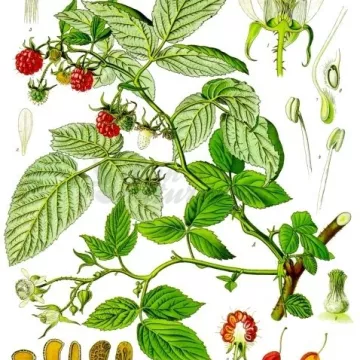
What is the raspberry bush?
The raspberry bush (Rubus idaeus) is a fruit-bearing shrub belonging to the Rosaceae family. Native to Europe and Asia, it is cultivated mainly for its sweet, fragrant raspberries, but also for its leaves, which are rich in active ingredients used in phytotherapy. Known for its many medicinal and nutritive virtues, the raspberry bush is a must-have both in gardens and in natural remedies.
What are the benefits of raspberry?
Raspberry is a plant with many benefits, both in terms of its fruit and its leaves:
Rich in antioxidants: Raspberries contain polyphenols and flavonoids that protect against cell aging.
Supports the female cycle: Raspberry leaves are reputed to regulate the menstrual cycle, relieve period pain and prepare the body for childbirth.
Boosts the immune system: Thanks to its high vitamin C content, raspberry helps stimulate the body's natural defenses.
Aids digestion: Rich in fiber, it helps regulate intestinal transit and prevent constipation.
Anti-inflammatory: Used to relieve sore throats, mouth inflammation and muscle pain.
Natural hypoglycemic: Raspberry leaves help regulate blood sugar levels, making it a good choice for people with diabetes.
How is raspberry used in phytotherapy?
Raspberry is commonly used in various forms in natural medicine:
Leaf infusion: to regulate the menstrual cycle and facilitate childbirth.
Glycerine macerate (raspberry buds): Used in gemmotherapy to rebalance female hormones.
In decoction: To soothe inflammation of the throat and mouth.
Mother tincture: Concentrated active ingredients, dilute in water for an invigorating effect.
Tip: For an infusion of raspberry leaves, steep 1 to 2 tablespoons of dried leaves in hot water for 10 minutes.
What are the benefits of raspberry leaves for women?
Raspberry leaves are particularly valued in natural gynecology:
Regulate the menstrual cycle and reduce premenstrual syndrome.
Relax uterine muscles, reducing menstrual cramps.
Prepare the uterus for childbirth, facilitating labor and strengthening contractions.
Supports fertility by balancing hormone production.
Caution: Raspberry leaf infusion is not recommended before the third trimester of pregnancy, except on medical advice.
What are the health benefits of raspberries?
Raspberries are real superfruits, rich in vitamins and minerals:
Boost immunity thanks to their high vitamin C content.
Protect the heart by reducing bad cholesterol and improving blood circulation.
Support the brain and reduce the risk of cognitive decline.
Promote healthy transit thanks to their high fiber content.
Help with weight management, as they are low in calories but rich in nutrients.
How do I grow a raspberry bush in my garden?
The raspberry bush is an easy-to-grow shrub, ideal for gardens and vegetable patches. Here are a few tips:
Exposure: It prefers a sunny to semi-shaded area.
Soil: Light, moist and well-drained.
Watering: Regularly in dry periods, without overwatering.
Planting: Preferably in autumn or spring, spacing plants 50 cm apart.
Pruning: After fruiting, remove dry branches and old twigs to encourage regrowth.
When to harvest raspberries?
Raspberry harvesting depends on the variety grown:
Non-remontant raspberries : A single harvest in June-July.
Everbearing raspberries: Two harvests, one in July and another in September-October.
Tip: Pick ripe raspberries when they can be easily removed without forcing.
What are the main pests and diseases of raspberries?
Raspberries can be attacked by a number of insects and diseases:
Raspberry worm (drosophila): To avoid these pests, use protective netting.
Botrytis (gray mold): Favored by excessive humidity, it can be limited by good plant spacing.
Aphids: Treat with natural solutions such as black soap.
Raspberry rust: A fungus that causes yellow spots on the leaves, to be avoided by spacing plants well apart.
How to store raspberries?
Fresh raspberries are fragile and keep for a short time:
Refrigerator: 2 to 3 days maximum in an airtight box.
In the freezer: Spread them out on a plate before placing them in an airtight bag.
In jam or coulis: An excellent way to prolong their flavor all year round.
What culinary uses are there for raspberries?
Raspberries are an ingredient of choice in the kitchen:
Plain or in fruit salads
In pastries (tarts, macaroons, cakes, mousses)
In homemade jams and jellies
In juice, smoothie or syrup
Combined with chocolate or almonds for a gourmet dessert